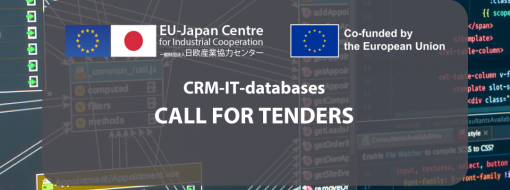

Contracting authority: EU-Japan Centre for Industrial Cooperation (EUJCIC)
Procurement name: Request for an audit/diagnostic of the EU-Japan Centre’s current IT infrastructure, aiming to setup an integrated and unified CRM/dashboard/database solution
Procurement reference number: T6.2-WP6-24
Type of procurement procedure: Call for tender
Code name: CRM/IT audit
Type of procurement contract: Services contract
Terms of Reference:
In response to this call for tender, interested parties are required to submit a written proposal for the conduct of the audit/diagnostic of the EU-Japan Centre’s current IT infrastructure as per the below requirements. All clarification questions must be received on 21 August 2024 at latest and written proposals must be received on 23 August 2024 at latest by email at applications@eu-japan.eu with “CRM/IT audit proposal – your company name” as format in the email subject.
Contact:
EU-Japan Centre for Industrial Cooperation
Head Office, Shirokane-Takanawa Station Bldg, 4F, 1-27-6 Shirokane, Minato-ku, Tokyo 108-0072, Japan
European Office, rue Marie de Bourgogne 52/2, 1000 Brussels, Belgium
applications@eu-japan.eu
BACKGROUND
The EU-Japan Centre for Industrial Cooperation (EUJCIC) is a joint venture established in 1987 by the European Commission (DG GROW) and the Japanese Government (METI) for promoting all forms of industrial, trade and investment cooperation between the EU and Japan. It is jointly funded and managed by both sides. Around 25 staff members work at the Centre’s head office in Tokyo and 15 staff members at its European office in Brussels. Activities and tasks covered by this Call for Tender are implemented in the context of an EU funding grant agreement.
This Call for Tender is for EUJCIC to identify, assess and select a suitable supplier to conduct a diagnostic on its current systems and propose solutions, with a strong degree of integration, to cover the needs of both of the Centre’s offices in terms of Customer Relationship Management (CRM) system, database(s) and dashboard(s) for EU-funded activities. EUJCIC does not aim to implement a fully-customised IT solution and is seeking a comparative analysis enabling the selection of the most suited off-the-shelve solution allowing a fair level of customisation and supporting EU-funded project cycle processes. The solution should be able to support users who make use of Japanese and English in their daily work and data in both languages would be present in the system. The Centre currently makes use of Filemaker in its Brussels office and a mix of solutions including Salesforce in its Tokyo Office.
Using the conclusions of the diagnostic as a key piece of information, the Centre would then move to the next phase of its project and seek suppliers to work on the implementation of a selected solution across its Tokyo and Brussels offices.
OBJECTIVES
As per the background information provided, an off-the-shelve solution allowing a reasonable level of customisation and contributing to EU-funded project processes (mainly reporting, monitoring and implementation) and Japanese and English is sought.
The diagnostic should assess the best IT solutions to meet the minimum objectives specified below and during your analytical work. To understand the internal needs and carry out the diagnostic, EUJCIC foresaw that at minimum the expert/staff carrying out the diagnostic would need to have online or face-to-face meetings with the below EUJCIC staff:
CRM:
Global objective: setup a new integrated Customer Relationship Management (CRM) System covering both offices of the Centre and all EU-funded programmes of the Centre to ensure a systematic and structured monitoring and follow-up of the Centre’s customers.
This would help the Centre to:
Dashboards:
Global objective: to establish dashboards to provide immediate visibility on key items and figures to the upper management of the Centre, all programme managers and officers, coupled with the possibility to export this data.
This would entail the below:
Databases:
Global objective: as a collateral impact, existing databases will have to be reviewed to serve the purposes of the CRM tool and dashboards. The objective will be to integrate or interconnect the different contact databases that different programmes of the Centre use in Japan and Europe.
DELIVERABLES
At the end of the audit/diagnostic, the following would be delivered to EUJCIC:
ELIGIBILITY
SUBMISSION
Your proposal would please need to include the below:
Please send your clarification questions on 21 August 2024 at latest and proposals on 23 August 2024 to applications@eu-japan.eu with “CRM/IT audit proposal – your company name” as format in the email subject. Thank you!
SELECTION
Eligible applications will be assessed according to best value for money principles by an evaluation committee composed of staff members of the two EUJCIC offices (Brussels, Tokyo) as per the below criteria:
TIMELINE
In order to deliver its overall project (diagnostic plus system implementation) within its current EU grant agreement timeframe the below timeline is foreseen:
OTHER INFORMATION
The EU-Japan Centre currently produces 5 newsletters :










Joint venture established in 1987 by the European Commission (DG GROW) and the Japanese Government (METI) for promoting all forms of industrial, trade and investment cooperation between the EU and Japan.
The EU-Japan Centre’s activities are subject to the allocation of a Grant Agreement by the European Commission for 2024-2026

